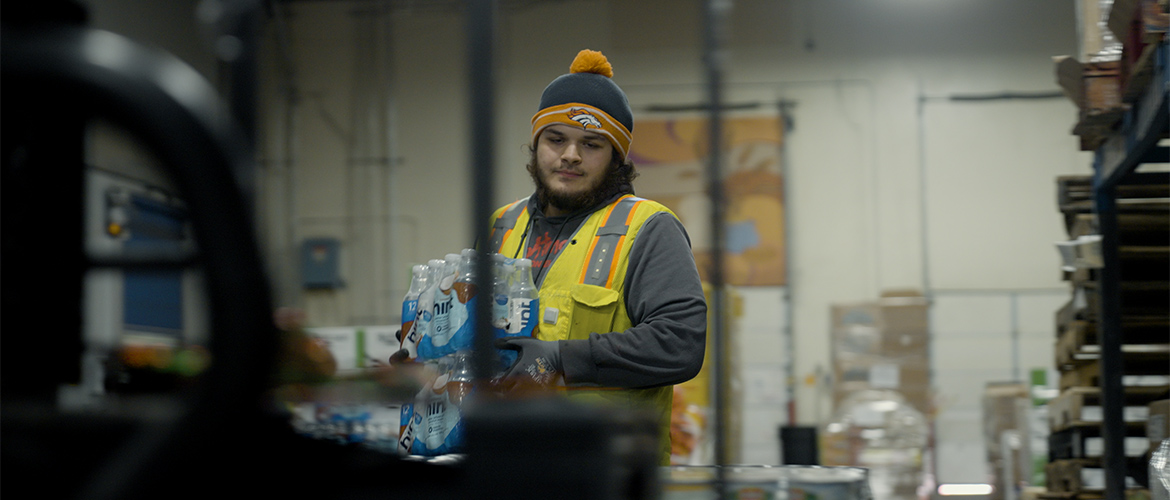Terrance Williams credits the workforce development program at Roadrunner Food Bank in Albuquerque for helping him regain his confidence and purpose after a debilitating accident left him physically limited and depressed.
The program, which provides job training, case management and social services up to four months, helped support Williams as he mastered skills and recovered from his injuries. Before completing the program, he learned every job in the warehouse, including building and wrapping pallets of food, as well as driving and operating forklifts and pallet jacks.
“There ain’t nothing I can’t do,” says Williams, proud and self-assured. “The program put me in a place in my life to where I know I can do it. It motivated me to go farther and farther each day. I am thankful for it.”
Roadrunner’s workforce development program is a paid internship to help people struggling to find or keep a job to develop the skills and confidence they need to get long-term employment. It’s targeted toward veterans, first-time job seekers, people with disabilities or those who have been justice involved.
In 2018, Blue Cross and Blue Shield of New Mexico began collaborating with the national hunger-relief organization Feeding America® and helped launch the Good Jobs Challenge in 2023 to address causes of hunger, including job training needs. The program strengthens in-house workforce training programs and connects workers to jobs. It also establishes employer partnerships to create opportunities for job seekers and help grow workforce development programs.
Last year, BCBSNM extended its commitment to the program. Thirteen food banks in nine states, including Roadrunner, are serving more than 400 people and awarding over 200 new certifications.
“The pandemic highlighted the importance that social and economic factors have on health,” says Maggie Sugrue, a manager of corporate and civic partnerships for BCBSNM. “And when we were selecting our partners and in conversations with Feeding America, we were really excited about their ability to understand the needs of the local communities and take an evidence-based, data-driven approach in their program design.”
Participants in Roadrunner’s program learn new skills and develop an employment history while helping provide food to New Mexicans in need. They receive a weekly stipend while earning job and food safety certifications. Meantime, case management helps participants overcome employment barriers, including scheduling work around mandatory meetings with probation officers and others.
“The idea was to reach out to people who may have been struggling with day-to-day things,” says Teresa Trujillo, Roadrunner’s job training program manager. “If employment was any part of that, we wanted to try to resolve that. The benefit of having this program is not only to train people that may have difficulty ordinarily finding employment, but it also enhances our mission here to feed people.”
Nearly 15 million people in the U.S. who want to work, particularly people of color, can’t find a job, according to the Georgetown University Center on Poverty and Inequity. Researchers looked at more than 40 years of studies on U.S. workforce development programs and found subsidized employment is a proven anti-poverty strategy.
For years, food banks in Feeding America’s network have created programs to help their clients gain skills to improve their job prospects, says Lisa Mayse-Lillig, the organization’s vice president of innovative programs and partnerships. More than half the organizations in the network offer a workforce development program or want to start them.
The economic downturn triggered by the COVID-19 pandemic revealed that food bank clients across the country needed a path toward meaningful employment.
“We really saw it not only as a challenge to us, but a responsibility for us to be responsive to the community that we're serving,” Mayse-Lillig says. Job skills, economic mobility, health care and other needs, she says, are interconnected with food insecurity.
Roadrunner helps graduating interns find permanent employment at the food bank or with employer partners in the community. Full-time warehouse specialists at Roadrunner can receive free training to earn a commercial driver’s license.
“People don't work for a lot of different reasons,” Trujillo says. “And we've seen over the years, people can overcome some of the things that have gotten in the way of work before. I have yet to meet anyone who does not want to work.”
A grandfather, Martin Moreno had been justice-involved before completing the program and becoming a truck driver for Roadrunner.
“I'm just looking to go forward and enjoy the rest of my time here on Earth with my family and my granddaughters because I missed a lot of their growing up,” Moreno says. “I just have to be stable. It's not just for myself. It's for those who really know who I am and what I'm capable of doing.”

